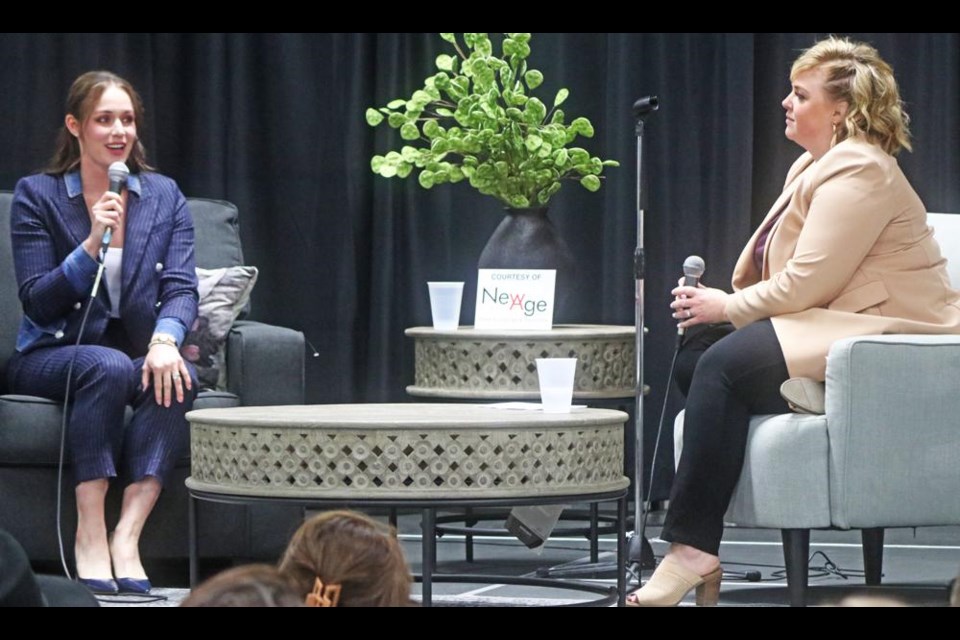WEYBURN – Olympic champion figure skater Tessa Virtue shared the story of her rise to success as the ice dance partner with Scott Moir, with a Weyburn audience at a special “Evening with Tessa Virtue” hosted by the Weyburn Young Fellows.
The fundraiser supper and silent auction was held on Thursday evening at the Weyburn Exhibition Hall, after the skater was originally to appear here in 2020. That event had to be postponed due to COVID restrictions.
With an audience made up many figure skaters and their families, she shared many memories and stories of her training and competitions in an interview-style talk moderated by Kathryn Gilliss, an Estevan lawyer who is very involved in the figure skating world.
Virtue started by sharing when and how she and Moir were paired up from a very young age, just starting out in figure skating, and in particular, in ice dance.
She said from the start, there was nothing remarkable about them, but she had a love of dance with its artistry and story-telling aspects.
“When we were eight and 10, we worked with a psychologist. She instilled in us the notion that words had an impact on one another. We were aligned in our purpose, and that resonated with us,” she said, noting they watched other skating couples around them bickering, fighting and name-calling, but they determined to respect each other.
When she was 15 and he was 17, they started doing marriage counselling, “even though we were never romantically involved, but every day we committed to building each other up. My goal was make Scott feel like he was the best athlete he could possibly be, and he did the same for me,” she said, adding that from the age of seven up to their 30s, they went through a lot, but what helped them achieve their goals was building up each other’s confidence.
She recalled at the 2018 Olympics, when the music stopped, she saw Scott as a nine-year-old boy. “I got to see my success as his,” she said, and seeing him get his medal meant more to her than receiving one for herself.
Asked about the process of getting into the Olympics, Virtue explained they had four cycles or chapters, and the first one was the goal to win at the national championships in 2006, as it was the Olympic qualifier. They placed second, and as a result were not chosen for the Olympic team.
“I was 16 and I was devastated. I didn’t stop crying for weeks on end,” she said, noting they later committed to each other to never be in that position again.
“We went into the 2010 Olympics so naïve and so innocent. … We had determined to win the world championships in 2009 and the Olympics in 2010, that was our plan. No team had ever gone on to win the Olympics. We knew the cards were stacked against us,” she said, noting they decided to train for 13, 14, even 15 hours a day, and “we wore that as a badge of honour. We totally ran ourselves into the ground, and we thought were training smart.”
The result was a year after those Olympics, she had to have surgery on her shins instead of skating at the worlds.
Skating at the Olympics was a special experience for her and Scott, as she described the feelings she had.
“When we stepped on the ice, there was something about it. I turned to Scott and said, ‘we own this rink’. It seemed that time stopped, things moved both quickly and slowly, and we were completely in synch. We willed ourselves to win. That sounds crazy, but at 20 and 22, we had the country behind us,” she said, adding that the Sochi Olympics was a different story.
They felt a lot of pressure there, as it seemed anything but a gold medal would be a complete failure.
“We were pleased with our performance, but we were so tired and almost disillusioned with the sport, we stepped back from competition,” she said, but it didn’t take long after that for the desire to skate and compete came back again.
“In 2014, we lost ourselves in trying to appease so many other people. We were trying to please the judges instead of knowing who we wanted to be,” said Virtue.
In preparing for the 2018 Olympics in Pyongchang, they spent two years simulating the Olympic experience, playing audience noises before playing the music. When they were chosen to be the flagbearers for Team Canada, the Olympic committee sent the flagpole to them so they could practice with it.
The program they chose for those Olympics was to skate to “Moulin Rouge”, which was Scott’s idea. Their coaches said this was not a good choice of music, but when they skated to it, “they saw us come alive, it was undeniable that was meant for us.”
Virtue said later that was also her favourite program of all of them. Even after the Olympics, they skated in an ice show to that music some 70 or 80 times and she still loved it.
“There were so many layers I could tap into. It came from within us, and Scott was such a fun partner to work off of,” she said.
Referring to her as an “iconic female role model”, Gilliss asked what she would tell her younger self. Virtue said, “I think there’s something really powerful about balance. There are so many benefits to being more well-rounded and trying different activities, like art and music. That exposure is critical. …
“Dreaming big. We have so many role models who show what is possible for women. Just know you have all the tools inside you. You have everything you need to succeed. You’re perfect exactly the way you are. Be you and be your unique self, that’s what the world needs.”






